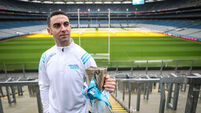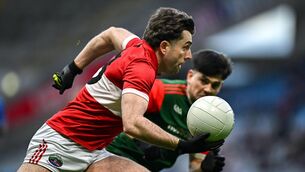How Galway's three-in-a-row sharpshooter Cyril Dunne mastered his kicking craft

TRIBES LEGEND: Former Galway footballer Cyril Dunne from Ballinasloe who was a member of the 3 in a row team in the 1960's to win All Ireland football finals, pictured with his wife Bernadette. Photo: Ray Ryan
Before moving to Cork nine years ago, I used to sing in the church choir up home in Clontuskert. Our choirmistress was a lady by the name of Bernie Dunne.
Earlier this week, I rang Bernie, reminded her who I was, given we hadn’t spoken in almost a decade, and inquired to know would her husband be able and willing for a stroll down memory lane.











